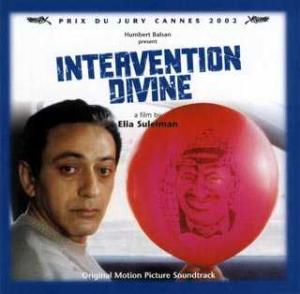Intervention Divine (Yadon ilaheyya)
Songs performed by Natacha Atlas, Joi, Mirwais, and others
Available on Milan Records (74321 97634 2)
Running Time: 47:17

Elia Suleiman's fifth film tells the story of a man whose love for a Palestinian woman is emotionally-divided between his family loyalty and the sociological impact of a volatile political climate. A recipient of a Jury prize at this year's Cannes Festival, the film continues writer/director Suleiman's fascination with the political tension engulfing his homeland and its effect upon individuals therein.
The film's soundtrack album presents ten songs, predominantly showcasing the work of well-known contemporary European artists. Beginning with a distinctive arrangement of "I Put A Spell On You", Natacha Atlas provides her captivating vocal talents to a unique blend of Arabian popular music and trip-hop drum rhythms courtesy of Trans-Global Underground. The meeting of Eastern and Western musical traditions continue in Mohammed Abdel Wahab's "Ana Oual Azab". The father of the Arabic film musical, Wahab was renowned for coupling diametrically-opposed musical traditions with conventional Egyptian techniques. Here his rumba incorporates flavours of Western orchestral instrumentation, yet is let-down by a tiresome structure and a distinct lack of modulation. In response, the proceedings are put right back on track with Joi's "Fingers", the opener from the band's acclaimed debut album which fuses hip-hop rhythms with Bengali musical influences. However, the mule that is Amon Tobin's "Easy Muffin" follows. Tobin's dissatisfying ambient ramblings combine warring urban grooves with chalumeau clarinet flourishes and a suicidally-repetitious motif for electric piano. Eventually they disintegrate into a disingenuous mass of oscillating low frequencies before the Motown chordal progressions and rap vocals of "Wala Ala Baloh", featuring the voice of Egyptian artist Amir Diab, appear.
The latter half of the album begins by serving up the retro-funk vibe of Marc Collin's theme from Les Kidnappeurs (1998). This solely instrumental effort offers more than a passing nod to the writing of Morricone, Barry, and even Isaac Hayes with its pastiche of 1960's and 70's stereotypes - Cimbalom trills, suggestive wa-wa guitar licks, and lyrical unison violin phrases. However, it's more of a respectable effort than a remarkable one and feels decidedly out-of-place on the disc when coupled next to Nour El Houda's eminently forgettable "Tango El Amal". Thankfully, the trippy, modern electro-pop of Mirwais comes to the rescue with "Definitive Beat". Noted for his collaborations with artists such as Madonna and Giorgio Moroder, it's easy to see why Mirwais Ahmadzai's career is enjoying a resurgence when listening to this song. With its pounding backbeat and clever use of analogue sounds, the track is a surprising highlight of the disc that improves with every listen. All that's left is for French band Soapkills to play out with the excellent "Tango", featuring a marvellously defined female solo vocal alongside well cut drum-loops, and the disappointing instrumental, "Dub4me".
It is very rewarding to hear the musical language of vastly different cultures coming together, especially in a mainstream soundtrack release, for those of you still paying attention. To that end the disc warrants credit, for it provides an accessible introduction to contemporary music whose influence lies in the cultures of North Africa and the Middle East. However, I cannot help thinking that whilst the niche market for such a release is so small, it will be overlooked not just by the vast majority, but by those people whose musical interest lies in this market. This is principally because the compiled tracks are readily available elsewhere and are let down here by lacklustre sequencing. Ultimately, despite the best of the intentions, this album is an overall disappointment.
Glen Aitken
2
Return to Index